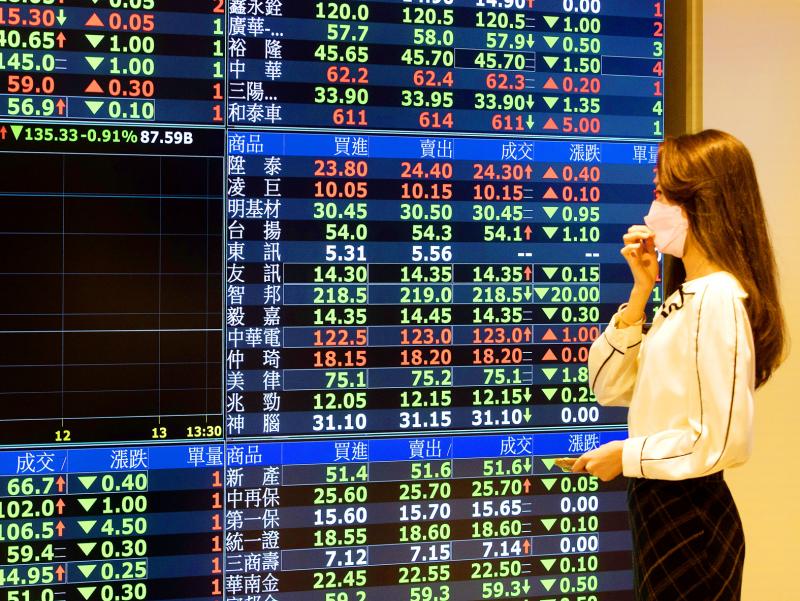The TAIEX slid again yesterday, declining more than 20 percent from a January high and entering a bear market.
The weighted index closed 3.26 percent lower in Taipei at 14,343.08 points. Taiwan Semiconductor Manufacturing Co (TSMC, 台積電), which accounts for more than one-quarter of the index’s weighting, declined 4.73 percent to close at NT$453.5 amid broad weakness in the chip sector following Micron Technology Inc’s disappointing forecasts.
Tech-heavy equity markets in Taiwan and South Korea were among the worst performers in Asia last quarter, both down more than 15 percent amid rate hikes by global central banks. Foreign investors net sold more than US$16 billion of Taiwanese stocks during the three-month period, the most among emerging Asian markets outside of China.

Photo: CNA
“Taiwan stocks declined due to several negatives, including global inflation concerns, growth slowdown fears and rate hikes, which lead to global funds returning to the US from emerging markets,” President Capital Management (統一投顧) chairman Li Fang-kuo (黎方國) said. “The downward trend of Taiwan stocks will continue, so investors should avoid catching the falling knife.”
The TAIEX dropped 6.3 percent this week, the biggest weekly decline in 13 months.
Investor sentiment soured on tech stocks worldwide due to fears of a global recession and a cautious outlook for the semiconductor sector.
The Taiwan Stock Exchange said in a statement on Thursday it would adopt stabilizing measures if needed when there are “irrational” declines in the stock market.
Separately, Deputy Minister of Finance Frank Juan (阮清華), executive secretary of the National Financial Stabilization Fund, said the fund would continue to monitor the stock market to determine if it needs to step in.
SinoPac Securities Investment Service Corp (永豐投顧) said in a note that if the administration of US President Joe Biden cancels tariffs on Chinese goods, some of which are due to expire on Wednesday next week, it would boost markets.

Among the rows of vibrators, rubber torsos and leather harnesses at a Chinese sex toys exhibition in Shanghai this weekend, the beginnings of an artificial intelligence (AI)-driven shift in the industry quietly pulsed. China manufactures about 70 percent of the world’s sex toys, most of it the “hardware” on display at the fair — whether that be technicolor tentacled dildos or hyper-realistic personalized silicone dolls. Yet smart toys have been rising in popularity for some time. Many major European and US brands already offer tech-enhanced products that can enable long-distance love, monitor well-being and even bring people one step closer to

Malaysia’s leader yesterday announced plans to build a massive semiconductor design park, aiming to boost the Southeast Asian nation’s role in the global chip industry. A prominent player in the semiconductor industry for decades, Malaysia accounts for an estimated 13 percent of global back-end manufacturing, according to German tech giant Bosch. Now it wants to go beyond production and emerge as a chip design powerhouse too, Malaysian Prime Minister Anwar Ibrahim said. “I am pleased to announce the largest IC (integrated circuit) Design Park in Southeast Asia, that will house world-class anchor tenants and collaborate with global companies such as Arm [Holdings PLC],”

TRANSFORMATION: Taiwan is now home to the largest Google hardware research and development center outside of the US, thanks to the nation’s economic policies President Tsai Ing-wen (蔡英文) yesterday attended an event marking the opening of Google’s second hardware research and development (R&D) office in Taiwan, which was held at New Taipei City’s Banciao District (板橋). This signals Taiwan’s transformation into the world’s largest Google hardware research and development center outside of the US, validating the nation’s economic policy in the past eight years, she said. The “five plus two” innovative industries policy, “six core strategic industries” initiative and infrastructure projects have grown the national industry and established resilient supply chains that withstood the COVID-19 pandemic, Tsai said. Taiwan has improved investment conditions of the domestic economy

Sales in the retail, and food and beverage sectors last month continued to rise, increasing 0.7 percent and 13.6 percent respectively from a year earlier, setting record highs for the month of March, the Ministry of Economic Affairs said yesterday. Sales in the wholesale sector also grew last month by 4.6 annually, mainly due to the business opportunities for emerging applications related to artificial intelligence (AI) and high-performance computing technologies, the ministry said in a report. The ministry forecast that retail, and food and beverage sales this month would retain their growth momentum as the former would benefit from Tomb Sweeping Day